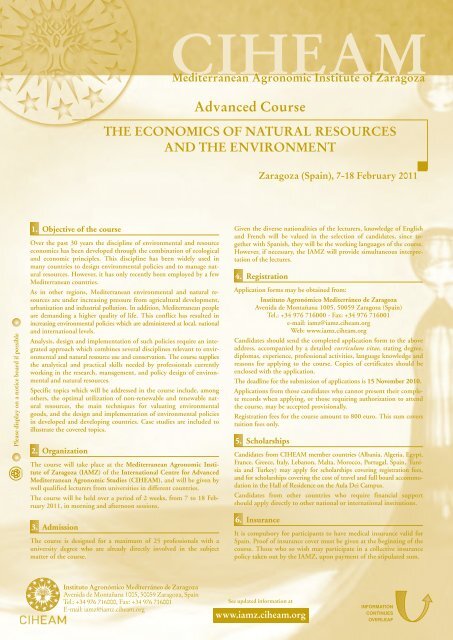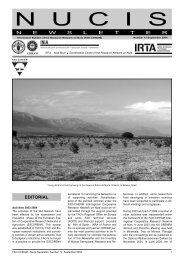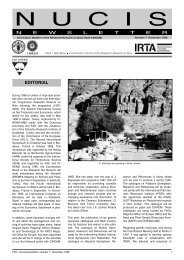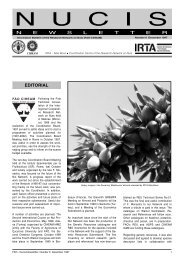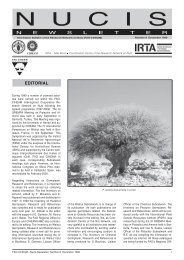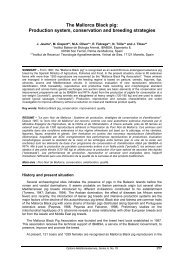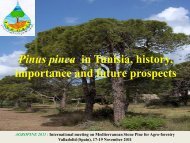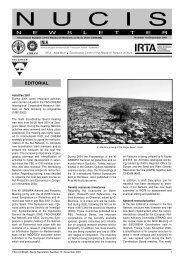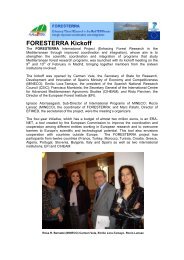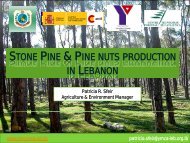PDF FILE - IAMZ - ciheam
PDF FILE - IAMZ - ciheam
PDF FILE - IAMZ - ciheam
You also want an ePaper? Increase the reach of your titles
YUMPU automatically turns print PDFs into web optimized ePapers that Google loves.
CIHEAM<br />
Mediterranean Agronomic Institute of Zaragoza<br />
Advanced Course<br />
THE ECONOMICS OF NATURAL RESOURCES<br />
AND THE ENVIRONMENT<br />
Zaragoza (Spain), 7-18 February 2011<br />
Please display on a notice board if possible<br />
1. Objective of the course<br />
Over the past 30 years the discipline of environmental and resource<br />
economics has been developed through the combination of ecological<br />
and economic principles. This discipline has been widely used in<br />
many countries to design environmental policies and to manage natural<br />
resources. However, it has only recently been employed by a few<br />
Mediterranean countries.<br />
As in other regions, Mediterranean environmental and natural resources<br />
are under increasing pressure from agricultural development,<br />
urbanization and industrial pollution. In addition, Mediterranean people<br />
are demanding a higher quality of life. This conflict has resulted in<br />
increasing environmental policies which are administered at local, national<br />
and international levels.<br />
Analysis, design and implementation of such policies require an integrated<br />
approach which combines several disciplines relevant to environmental<br />
and natural resource use and conservation. The course supplies<br />
the analytical and practical skills needed by professionals currently<br />
working in the research, management, and policy design of environmental<br />
and natural resources.<br />
Specific topics which will be addressed in the course include, among<br />
others, the optimal utilization of non-renewable and renewable natural<br />
resources, the main techniques for valuating environmental<br />
goods, and the design and implementation of environmental policies<br />
in developed and developing countries. Case studies are included to<br />
illustrate the covered topics.<br />
2. Organization<br />
The course will take place at the Mediterranean Agronomic Institute<br />
of Zaragoza (<strong>IAMZ</strong>) of the International Centre for Advanced<br />
Mediterranean Agronomic Studies (CIHEAM), and will be given by<br />
well qualified lecturers from universities in different countries.<br />
The course will be held over a period of 2 weeks, from 7 to 18 February<br />
2011, in morning and afternoon sessions.<br />
Given the diverse nationalities of the lecturers, knowledge of English<br />
and French will be valued in the selection of candidates, since together<br />
with Spanish, they will be the working languages of the course.<br />
However, if necessary, the <strong>IAMZ</strong> will provide simultaneous interpretation<br />
of the lectures.<br />
4. Registration<br />
Application forms may be obtained from:<br />
Instituto Agronómico Mediterráneo de Zaragoza<br />
Avenida de Montañana 1005, 50059 Zaragoza (Spain)<br />
Tel.: +34 976 716000 - Fax: +34 976 716001<br />
e-mail: iamz@iamz.<strong>ciheam</strong>.org<br />
Web: www.iamz.<strong>ciheam</strong>.org<br />
Candidates should send the completed application form to the above<br />
address, accompanied by a detailed curriculum vitae, stating degree,<br />
diplomas, experience, professional activities, language knowledge and<br />
reasons for applying to the course. Copies of certificates should be<br />
enclosed with the application.<br />
The deadline for the submission of applications is 15 November 2010.<br />
Applications from those candidates who cannot present their complete<br />
records when applying, or those requiring authorization to attend<br />
the course, may be accepted provisionally.<br />
Registration fees for the course amount to 800 euro. This sum covers<br />
tuition fees only.<br />
5. Scholarships<br />
Candidates from CIHEAM member countries (Albania, Algeria, Egypt,<br />
France, Greece, Italy, Lebanon, Malta, Morocco, Portugal, Spain, Tunisia<br />
and Turkey) may apply for scholarships covering registration fees,<br />
and for scholarships covering the cost of travel and full board accommodation<br />
in the Hall of Residence on the Aula Dei Campus.<br />
Candidates from other countries who require financial support<br />
should apply directly to other national or international institutions.<br />
3. Admission<br />
The course is designed for a maximum of 25 professionals with a<br />
university degree who are already directly involved in the subject<br />
matter of the course.<br />
6. Insurance<br />
It is compulsory for participants to have medical insurance valid for<br />
Spain. Proof of insurance cover must be given at the beginning of the<br />
course. Those who so wish may participate in a collective insurance<br />
policy taken out by the <strong>IAMZ</strong>, upon payment of the stipulated sum.<br />
Instituto Agronómico Mediterráneo de Zaragoza<br />
Avenida de Montañana 1005, 50059 Zaragoza, Spain<br />
Tel.: +34 976 716000, Fax: +34 976 716001<br />
E-mail: iamz@iamz.<strong>ciheam</strong>.org<br />
See updated information at<br />
www.iamz.<strong>ciheam</strong>.org<br />
INFORMATION<br />
CONTINUES<br />
OVERLEAF
7. Teaching organization<br />
The course requires personal work and interaction among participants<br />
and with lecturers. The international characteristics of the<br />
course favour the exchange of experiences and points of view. Formal<br />
lectures are complemented by case studies, a technical visit and computer<br />
practicals. Furthermore, various sessions have been organised<br />
during the course in which participants can present problems that<br />
arise in their professional activity or in projects they may wish to embark<br />
upon in the near future, providing a forum of exchange between<br />
lecturers and course participants.<br />
8. Programme<br />
1. The interaction between economics and the environment. Concepts<br />
in environmental and natural resource economics (1 hour)<br />
2. Natural resource economics (18 hours)<br />
2.1. Non-renewable resources<br />
2.1.1. Initial stocks, reserve to consumption ratios: behaviour<br />
over time<br />
2.1.2. Hotelling’s rule<br />
2.1.3. Optimum path of depletion and sensitivity analysis<br />
2.1.4. Case study: Oil reserves<br />
2.2. Renewable resources<br />
2.2.1. Forestry<br />
2.2.1.1. Theoretical considerations<br />
2.2.1.2. Optimal rotation models for a multifunctional<br />
forest<br />
2.2.1.3. Multicriteria analysis<br />
2.2.1.4. Computer applications<br />
2.2.1.5. Case study: Carbon sequestration<br />
2.2.2. Water<br />
2.2.2.1. Theoretical considerations<br />
2.2.2.2. Water uses and services<br />
2.2.2.3. Water markets and pricing<br />
2.2.2.4. Watershed planning and management<br />
2.2.2.5. Cost-benefit analysis<br />
2.2.2.6. Case study: Measuring vulnerability of water<br />
resources – the indicator method<br />
2.2.2.7. Case study: Modelling watershed impacts<br />
with economic models<br />
3. Environmental economics (30 hours)<br />
3.1. Environmental valuation and assessment<br />
3.1.1. Equivalency analysis for natural resource damage assessments<br />
3.1.2. Introduction to valuation methods<br />
3.1.3. Hedonic pricing and travel cost methods<br />
3.1.3.1. Theoretical foundations<br />
3.1.3.2. Implementation<br />
3.1.3.3. Application examples and computer practice<br />
3.1.4. Contingent valuation and choice modelling methods<br />
3.1.4.1. Contingent valuation: theoretical foundations<br />
and implementation<br />
3.1.4.2. Choice modelling theory: implementation and<br />
case studies<br />
3.1.5. Cost-benefit analysis. Theory and practice<br />
3.1.5.1. Theoretical foundations<br />
3.1.5.2. Criteria and forms in which to express results<br />
3.1.5.3. Case studies and computer applications<br />
3.2. Environmental policies<br />
3.2.1. Theoretical foundations and typology of instruments<br />
3.2.2. Instruments<br />
3.2.2.1. Price oriented market-based instruments<br />
3.2.2.2. Quantity-oriented market-based instruments<br />
3.2.2.3. Strategic interaction<br />
3.2.3. Applications<br />
3.2.3.1. Case study: Environmental taxes<br />
3.2.3.2. Case study: Tradable permits<br />
4. Discussion of doubts and problems in participants’ practical<br />
cases (7 hours)<br />
5. Conclusion (1 hour)<br />
6. Technical visit to the Natural Park the “Ebro Delta”<br />
GUEST LECTURERS<br />
F.J. ANDRÉ, Univ. Pablo de Olavide, Sevilla (Spain)<br />
R.T. DEACON, Univ. California, Santa Barbara (US)<br />
L. DÍAZ BALTEIRO, Univ. Politécnica de Madrid (Spain)<br />
M.D. GARCÍA, Univ. Autónoma de Barcelona (Spain)<br />
B. HURD, New Mexico State Univ., Las Cruces (US)<br />
X. LABANDEIRA-VILLOT, Univ. Vigo (Spain)<br />
P.A. MAHIEU, Univ. Rouen (France)<br />
P. RIERA, Univ. Autónoma de Barcelona (Spain)<br />
G. SIGNORELLO, Univ. di Catania (Italy)<br />
International Centre for Advanced<br />
Mediterranean Agronomic Studies<br />
Mediterranean Agronomic Institute of Zaragoza


